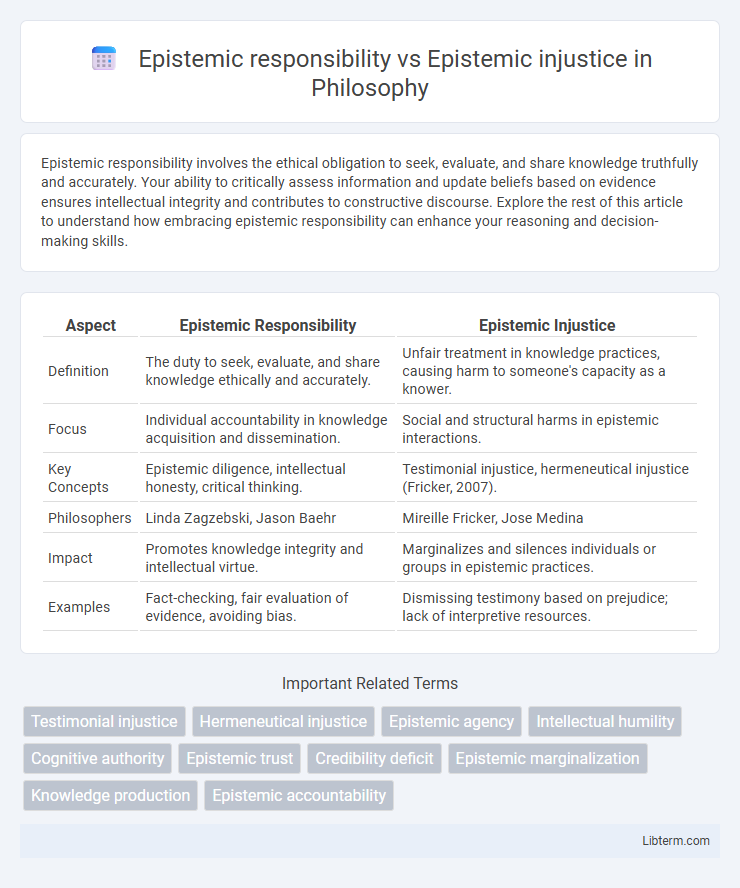Epistemic responsibility involves the ethical obligation to seek, evaluate, and share knowledge truthfully and accurately. Your ability to critically assess information and update beliefs based on evidence ensures intellectual integrity and contributes to constructive discourse. Explore the rest of this article to understand how embracing epistemic responsibility can enhance your reasoning and decision-making skills.
Table of Comparison
| Aspect | Epistemic Responsibility | Epistemic Injustice |
|---|---|---|
| Definition | The duty to seek, evaluate, and share knowledge ethically and accurately. | Unfair treatment in knowledge practices, causing harm to someone's capacity as a knower. |
| Focus | Individual accountability in knowledge acquisition and dissemination. | Social and structural harms in epistemic interactions. |
| Key Concepts | Epistemic diligence, intellectual honesty, critical thinking. | Testimonial injustice, hermeneutical injustice (Fricker, 2007). |
| Philosophers | Linda Zagzebski, Jason Baehr | Mireille Fricker, Jose Medina |
| Impact | Promotes knowledge integrity and intellectual virtue. | Marginalizes and silences individuals or groups in epistemic practices. |
| Examples | Fact-checking, fair evaluation of evidence, avoiding bias. | Dismissing testimony based on prejudice; lack of interpretive resources. |
Understanding Epistemic Responsibility
Understanding epistemic responsibility involves recognizing the obligation to seek, share, and evaluate knowledge accurately and fairly, ensuring that one's beliefs are well-founded and justifiable. This concept contrasts with epistemic injustice, which occurs when individuals are wronged specifically in their roles as knowers, often through prejudice or systemic bias that undermines their credibility. Fostering epistemic responsibility helps mitigate epistemic injustice by promoting accountability in knowledge practices and encouraging inclusive dialogue that respects diverse perspectives.
Defining Epistemic Injustice
Epistemic injustice occurs when individuals are wronged specifically in their capacity as knowers, typically through prejudice that undermines their credibility or access to knowledge. This concept is divided primarily into testimonial injustice, where a speaker's word is discredited due to bias, and hermeneutical injustice, where marginalized groups lack the shared interpretive resources to make sense of their experiences. Understanding epistemic injustice highlights the ethical imperative of epistemic responsibility, which demands active efforts to recognize and rectify knowledge-based wrongs within social interactions.
The Foundations of Epistemic Virtue
Epistemic responsibility centers on the duty of agents to seek, share, and evaluate knowledge with intellectual virtues such as open-mindedness and intellectual humility. In contrast, epistemic injustice involves unfair treatment in knowledge practices, typically manifesting as testimonial or hermeneutical injustice where certain voices are marginalized. The Foundations of Epistemic Virtue explores how cultivating epistemic virtues can combat epistemic injustice by fostering a more equitable and reliable epistemic environment.
Mechanisms of Epistemic Harm
Epistemic responsibility involves actively ensuring knowledge practices avoid perpetuating biases and misinformation, whereas epistemic injustice refers to the systemic wrongs inflicted when individuals are unfairly discredited or silenced in knowledge exchange. Mechanisms of epistemic harm include testimonial injustice, where a speaker's credibility is underestimated due to prejudice, and hermeneutical injustice, involving gaps in collective interpretive resources that marginalize certain groups' experiences. These mechanisms highlight how structural inequalities and individual biases undermine epistemic agency and the fair distribution of epistemic goods.
Comparing Epistemic Duty and Wrongdoing
Epistemic responsibility involves the duty to seek, share, and critically evaluate knowledge with intellectual honesty and openness, promoting trustworthy and accurate understanding. In contrast, epistemic injustice occurs when individuals or groups are wronged specifically in their capacity as knowers, often through testimonial injustice or hermeneutical injustice, undermining their credibility and participation in knowledge practices. Comparing these concepts highlights the tension between fulfilling epistemic duties to uphold fairness and accuracy and avoiding epistemic wrongdoings that perpetuate marginalization and epistemic harm.
Power, Knowledge, and Social Structures
Epistemic responsibility emphasizes the ethical obligation of individuals and institutions to recognize and address power imbalances in knowledge production and dissemination within social structures. Epistemic injustice occurs when marginalized groups are systematically silenced or discredited, reflecting unequal access to epistemic authority and reinforcing dominant power dynamics. Understanding how social hierarchies influence who is trusted as a knower is crucial to mitigating the harmful effects of epistemic injustice and promoting equitable knowledge practices.
Testimonial Injustice vs Hermeneutical Injustice
Epistemic responsibility requires individuals to critically evaluate and fairly assess knowledge claims, minimizing biases in the acquisition and sharing of information. Testimonial injustice occurs when a speaker's credibility is unjustly deflated due to prejudice, whereas hermeneutical injustice arises from structural gaps in collective interpretive resources that hinder understanding marginalized experiences. Addressing testimonial injustice involves promoting equitable listening practices, while rectifying hermeneutical injustice demands expanding societal interpretative frameworks to include marginalized perspectives.
Accountability in Epistemic Practices
Accountability in epistemic practices requires individuals to critically evaluate and justify their beliefs and knowledge claims to avoid spreading misinformation or biased perspectives. Epistemic responsibility entails a proactive commitment to truth-seeking, whereas epistemic injustice occurs when marginalized groups are unfairly discredited or silenced in knowledge production. Ensuring epistemic accountability fosters inclusive dialogue and equitable participation in the creation and validation of knowledge.
Cultivating Epistemic Justice in Society
Cultivating epistemic justice in society requires fostering epistemic responsibility among individuals and institutions to ensure fair participation in knowledge production and dissemination. This involves recognizing and addressing epistemic injustices such as testimonial injustice, where certain groups are unfairly discredited, and hermeneutical injustice, where marginalized communities lack the resources to make their experiences intelligible. Promoting inclusive dialogue and equitable access to epistemic resources strengthens social epistemology and supports a more just epistemic environment.
Strategies for Promoting Epistemic Integrity
Strategies for promoting epistemic integrity emphasize fostering open dialogue, critical self-reflection, and equitable participation in knowledge production, countering biases that lead to epistemic injustice. Implementing educational practices that highlight epistemic humility and accountability helps individuals recognize and correct their own epistemic errors. Institutional reforms encouraging diversity and inclusivity enhance collective epistemic responsibility by ensuring marginalized voices contribute to knowledge ecosystems.
Epistemic responsibility Infographic

 libterm.com
libterm.com